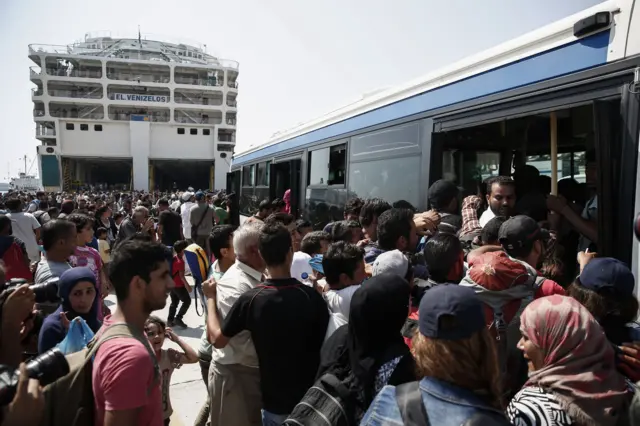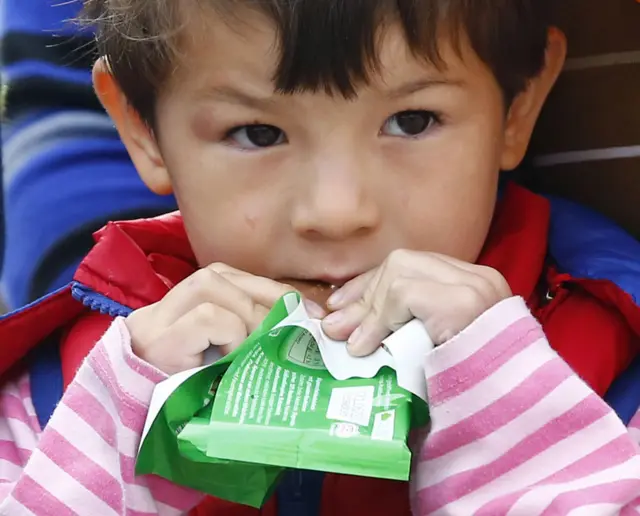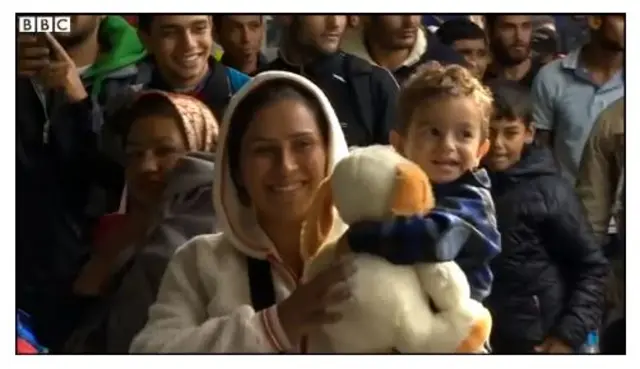Postpublished at 17:26
That brings today's live coverage of the EU migrant crisis to an end. For further updates please check the main BBC News site for the latest information.
Thousands of migrants crossed into Austria amid jubilation after Hungary removed restrictions on transit
Many migrants are now continuing their journey by train to Vienna
Hundreds have now arrived in Munich to be greeted by applauding crowds
Germany has promised to grant refugee status to those who fled the Syrian conflict
EU foreign affairs chief Federica Mogherini has warned that the migrant issue is "here to stay"
Jastinder Khera, Lauren Turner, Mario Cacciottolo and Alastair Lawson
That brings today's live coverage of the EU migrant crisis to an end. For further updates please check the main BBC News site for the latest information.
 Image source, AP
Image source, APMeanwhile further south along the route to Germany, more migrants and refugees have arrived from Turkey. This group is waiting to board a bus at the Greek port of Piraeus, which will take them to a metro station.
The BBC's Gavin Lee reports from Hungary that around 1,000 people are marching from Budapest station and are around 16km (10 miles) into the journey.
The Hungarian government is insisting there will be no repeat of the help for migrants trying to reach Austria, saying that buses were provided as a one off because of safety fears.
Our correspondent says policy at Budapest's main train station appears to have changed. Previously those without travel documents were stopped from travelling on international services, but today they were allowed to buy tickets for stations within Hungary, closer to the border.
For those that don't have money for tickets, another march to Austria is being planned for this evening.
One volunteer in Nickelsdorf, Johannes Noebel, said he felt compelled to help.
Quote MessageWhen I saw these pictures of the people walking on the highway yesterday night, I said...: we have to come and welcome them. And so when we heard that they will all end up here, we took a truck and loaded it full with water and food, and came here to help.
Quote MessageI think that it's really important to give a warm welcome to the people, also the many, many children that you see here.
An Austrian Red Cross employee in the border town of Nickelsdorf has told the BBC that migrants are being offered temporary shelter in a large tent filled with beds, on the outskirts of the town.
The tent was set up as part of a rock festival which ended a few weeks ago.
Authorities decided to leave it standing in anticipation of migrants arriving from Hungary.
 Image source, Reuters
Image source, ReutersMigrants have been arriving at Munich's main train station during the day, where they have been greeted by locals, some bearing gifts of sweets and chocolate.
The BBC's Ben Brown tweets:
A BBC News producer says that members of a group marching from Budapest are using technology to help them reach their destination:
The BBC's Anna Holligan reports from a rest stop some 17km west of Budapest which has been set up by local people for migrants marching to the Austrian border.
The volunteers, some of them British, have rucksacks and waterproofs as well as fruit and bottles of water to distribute to a group of migrants being escorted by police, our correspondent says.
The Guardian, external has been speaking to some of those in Germany who were waiting at Munich's train station to welcome people to the country.
Hedy Gupta, who handed out chocolate to the new arrivals, told the newspaper: "We just wanted them to know that the torture is over.
"I have children and a five-year-old grandchild of my own and when I think what they have been through, these children, it leaves me on the ground.”
BBC Radio 4's chief correspondent tweets:
Allow X content?
This article contains content provided by X. We ask for your permission before anything is loaded, as they may be using cookies and other technologies. You may want to read X’s cookie policy, external and privacy policy, external before accepting. To view this content choose ‘accept and continue’.
BBC News Europe reporter tweets:
Allow X content?
This article contains content provided by X. We ask for your permission before anything is loaded, as they may be using cookies and other technologies. You may want to read X’s cookie policy, external and privacy policy, external before accepting. To view this content choose ‘accept and continue’.
Nearly 2,500 people have arrived at the Greek port of Piraeus from the island of Lesbos, Reuters reports.
Latest from Nickelsdorf, Austria: An Austrian police officer tells the BBC's Ben Brown that nearly 5,500 refugees have been transported to Vienna's Westbahnhof after the authorities laid on extra trains and buses.
The policeman said about 200 to 300 refugees are currently indoors in Nickelsdorf and will be brought to the station just before the next train is due to depart, to save them waiting outdoors.

The BBC's Berlin correspondent Jenny Hill watched as hundreds of migrants, mostly from Syria, arrived at Munich train station to applause after boarding trains in Austria.
A large group of Germans who had gathered to welcome them cheered their arrival, with many handing out sweets and water.
European Union foreign ministers have discussed the possibility of setting up EU centres for refugees outside Europe as a way to deal with the migration crisis, Reuters reports.
Allowing refugees to request asylum in the Middle East and Africa could help stop thousands of people attempting the perilous journey to reach Europe, it says.
But it reports that EU foreign policy chief Federica Mogherini has warned that the idea would require "enormous resources".
"We cannot destabilise countries that are already facing enormous challenges when it comes to camps and refugees in the communities. And this would require enormous resources from our side to set them up," she says.
Sweden is the only European country with a majority favourable towards non-EU immigration, The Independent, external reports.
It says that even in Germany, where Chancellor Angela Merkel has insisted that the nation is well equipped to meet the refugee crisis, not everything is perfect, because it continues to be plagued by far-right attacks on refugee accommodation.
Citing a recent Eurostat survey, the paper says that between 71 and 77% of Swedes approve of non-EU immigration.
At the bottom of the list come Italy, the Czech Republic, Slovakia, Estonia and Latvia where only between 15 and 21% welcome immigrants.
A BBC News producer tweets:
Germany can cope with a record influx of refugees this year without raising taxes and without jeopardising its balanced budget, Chancellor Angela Merkel says, according to Reuters.
"We cannot just say 'Because we have a difficult task now, the balanced budget or the issue of debt are no longer important'," Mrs Merkel said in her weekly video podcast. , external
And in an interview with local newspapers, she said taxes would not be raised because of the migrant crisis.
A Guardian journalist tweets: